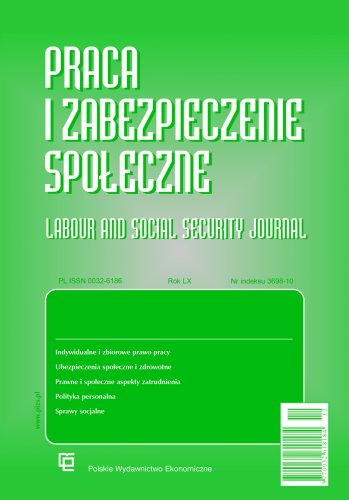European Parliament proposals to regulate the right to disconnect
In January 2021, The European Parliament adopted a resolution calling on the European Commission to adopt as soon as possible a directive establishing a so-called right to disconnect for all workers using digital tools for work purposes, a draft of which is annexed to the resolution. The right to disconnect is understood as the exclusion of digital tools for professional purposes outside of working time. The purpose of this article is to discuss the proposed legal framework for the right to disconnect and highlight the challenges that the right to disconnect must face. Analyzing the proposals of the European Parliament, the author draws attention, inter alia, to the doubts concerning the subjective scope of the right to disconnect. The biggest challenges include establishing practical arrangements for disabling digital tools, especially in the case of flexible working time arrangements, enterprises operating internationally and/or with continuous operations that prevent server shutdowns. The author also points out that the implementation of the right to disconnect cannot be focused on technical and organizational solutions but requires that the problem of workload and time management be solved in accordance with the right to disconnect.
References
Bibliografia/References
Von Bergen, C. V., Bressler, M. S. i Proctor T. L. (2019). On the Grid 24/7/365 and the Right to Disconnect. Employee Relations Law Journal, 45(2).
Carmichael, S. G. (2015). The Research Is Clear: Long Hours Backfire for People and for Companies. Harvard Business Review, (August).
Dima, L. i Högback, A. (2020). Legislating and right to disconnect. http://library.fes.de/pdf-files/bueros/bukarest/17025.pdf (02.01.2022).
ETUC (2020). Ramowe porozumienie partnerów społecznych w sprawie cyfryzacji. https://www.etuc.org/en/document/eu-social-partners-agreementdigitalisation (02.01.2022).
Eurofound (2020). The Right to Disconnect in the 27 EU Member States. https://www.eurofound.europa.eu/sites/default/files/wpef20019.pdf (02.01.2022).
European Parliamentary Research Service (2020). The Right to Disconnect. https://www.europarl.europa.eu/RegData/etudes/BRIE/2020/642847/ EPRS_BRI (2020) 642847_EN.pdf (02.01.2022).
Fairbrain, J. (2019). The Right to Disconnect: The Darker Side of Mis-Managed Flexible Working Arrangements. https://www.cle.bc.ca/practice-point/employment-law/the-right-to-disconnect/
GUS (2016). Społeczeństwo informacyjne w Polsce. https://stat.gov.pl/obszary-tematyczne/nauka-i-technika-spoleczenstwo-informacyjne/spoleczenstwoinformacyjne/spoleczenstwo-informacyjne-w-polsce-wyniki-badan-statystycznych-z-lat-2012-2016,1,10.html (02.01.2022).
Henshall, A. (2021). Governments have long been trying to enact laws to give workers the right to log off. But some fear there's no realistic way these rules can help a newly flexible workforce. https://www.bbc.com/worklife/article/20210517-can-the-right-to-disconnect-exist-in-a-remote-work-world (02.01.2022).
Kubiak, Sz. i Magnuska, K. (2021). Prawo do bycia offline. Realna ulga dla pracowników czy tylko dodatkowe obowiązki dla pracodawców? https://wardynski.com.pl/upload/2021/06/prawo-do-bycia-offline_pl.pdf
Loic, L. (2020). Labour Law and the Gig Economy: challenges posed by the digitalisation of labour processes. W: J. Carby-Hall i L. Mella Méndez (Red.), The right to disconnect from the workplace: strengths and weaknesses of the French legal framework. Abidngdon.
Messenger, J. C. (2011). Working time trends and developments in Europe. Cambridge Journal of Economics, 35(2). https://hbr.org/https://doi.org/10.1093/cje/beq022
Moras-Olaś, K. (2021). Prawo do bycia offline jako podstawowe prawo pracownika. Studia z Zakresu Prawa Pracy i Polityki Społecznej, (4). https://doi.org/10.4467/25444654SPP.21.024.14266
Naumowicz, K. (2021). Prawo do bycia offline a praca zdalna. W: M. Mędrala (Red.), Praca zdalna w polskim systemie prawnym. Warszawa.
Pansu, L. (2018). Evaluation of „Right to Disconnect' Legislation and Its Impact on Employee's Productivity. International Journal of Management and Applied Research, 5(3). https://doi.org/10.18646/2056.53.18-008
Rezolucja Parlamentu Europejskiego z 21.01.2021 r. zawierająca zalecenia dla Komisji w sprawie prawa do odłączenia (2019/2181 (INL). https://www.europarl.europa.eu/doceo/document/TA-9-2021-0021_PL.html (02.01.2022).
Secunda, P. M. (2019). The Employee Right to Disconnect. Notre Dame Journal of International & Comparative Law, 9(1). https://scholarship.law.nd.edu/ndjicl/vol9/iss1/
Seweryn, R. (2017). Technologie informacyjne i komunikacyjne — wprowadzenie w problematykę. W: J. Berbeka i K. Borodako (Red.), Technologie informacyjne i komunikacyjne na rynku turystycznym. Warszawa.
Surdykowska, B. (2019). Prawo „do odłączenia” — coraz większe wyzwanie we współczesnym świecie pracy. Monitor Prawa Pracy, (12).

